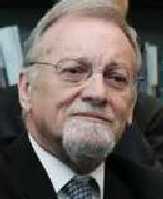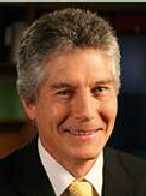|
Kosovo: fools rush in
by Kingfisher Sunday, Feb 17 2008, 8:04pm
international /
imperialism /
commentary
Former Australian Foreign Minister to the Hawke-Keating governments, Gareth Evans -- a man with much to hide regarding his complicity in the cover-up of the Balibo five murders -- today displayed his continuing infatuation with his own reflection in the pond of NATO/EU dreams! Evans, who is divorced from everything but the most myopic of views, expressed an opinion so completely divorced from reality one wonders whether the International Crisis Group (ICG) that now employs him, is in crisis itself!

Gareth Evans
Rarely have we witnessed a more biased and divorced from reality view. Evans seems to think that European history began with his arrival in Brussels. Oblivious to the thousand years of Serbian history -- inextricably bound to Kosovo – Evans rambled like the drunken, demented, narcissistic, buffoon that he is; however, in a not so extraordinary twist the current Australian Foreign Minister Stephen ‘deep throat’ Smith, rushed to articulate his servile “support” for Kosovo’s secession in the Australian Parliament – how unexpected!
Regardless of Australia’s recent change of government, Smith proved today that the infamous Aussie cringe is alive and well in the new Rudd Labor government. It will obviously take some time before the nation is able to discard its trainer potty! For the love of Kelly, Morant, Paterson, Lawson and the rest, when will this nation develop a mind of its own?
We look forward to questioning Gareth Evans regarding the Balibo murders and the Timor Gap Treaty the next time he visits Australia – we can assure readers that interview would be far more interesting and revealing than his current a-historical ramblings on Kosovo.
As for Stephen Smith the choice is clear, is it to be washerwoman’s knees and cauliflower ears or will he assert an independent Australian opinion -- it’s your throat, Mr Smith!
A for the rest of us, we have absolutely no illusions regarding the future of Kosovo, but most of us are historians and professional analysts.

Stephen Smith
COMMENTS show latest comments first show comment titles only
jump to comment 1
In Asian Reaction to Kosovo Declaration, Fears of Secession
by Keith Bradsher via rialator - The New York Times Sunday, Feb 17 2008, 8:46pm
HONG KONG -- China, Indonesia and Sri Lanka on Monday criticized Kosovo’s declaration of independence from Serbia while Taiwan and Australia welcomed it, as Kosovo’s move appeared a litmus test of attitudes in Asia toward secession.
The Beijing government, which has threatened military action if Taiwan declares formal independence, voiced “grave concern” at Sunday’s action by the Kosovo Parliament in Pristina.
“China is deeply worried about its severe and negative impact on peace and stability of the Balkan region and the goal of establishing a multi-ethnic society in Kosovo,” said Liu Jianchao, the Chinese foreign ministry spokesman.
China’s hostility to independence for Kosovo aligns it with Russia, a close ally of Serbia that has struggled with its own separatist movements over the years, most notably in Chechnya.
China is a permanent member of the United Nations Security Council and Mr. Liu alluded to the council in a statement on Monday that also seemed to tilt toward Russia and Serbia without taking a specific position. The Kosovo issue affects, “the fundamental norms governing international relations as well as the authority and role of the U.N. Security Council,” Mr. Liu said.
The Security Council began on Sunday a series of meetings this week at the request of Russia and Serbia, both of which are seeking to block independence for Kosovo.
The United States, Britain, France, Germany and Australia have begun preparing to extend diplomatic relations to Pristina, while Japan said on Monday that it was studying whether to do so.
Taiwan quickly congratulated Kosovo on Monday in terms that echoed the desire of some Taiwanese for a complete political break with mainland China. “Despite a multitude of barriers, the people of Kosovo have insisted on an ideal that they believe in, which is to peacefully pursue independence, without being threatened or scared away,” Taiwan’s foreign ministry said in a statement on Monday.
Diplomats from Taipei and Beijing maneuver constantly around the world to establish diplomatic ties with even the smallest countries — a struggle that Beijing has been winning lately, with just two dozen small countries left that still recognize Taiwan.
The Vatican is the only state in Europe to recognize Taiwan, prompting efforts in the past year by Taiwan to win favor, and perhaps eventual recognition, in Pristina.
“Of course, we would like to develop further relations with countries which cherish democracy and freedom,” said Phoebe Yeh, a Taiwan foreign ministry spokeswoman.
In Beijing, Mr. Liu responded that Taiwan was part of China and had no right to extend diplomatic recognition to anywhere.
China also faces frequent criticism from overseas groups objecting to its control of Tibet and Xinjiang province.
Kosovo’s actions touched a separate chord on Monday in Indonesia, which currently also holds a seat on the United Nations Security Council.
News agencies cited foreign ministry officials as criticizing Kosovo’s decision to act on independence without Serbian consent. President Susilo Bambang Yudhoyono of Indonesia said on Monday that his country would not take a stand on whether to recognize Kosovo until after the Security Council had finished discussing the issue, according to Indonesia’s official Antara news agency.
After a civil war that claimed 10,000 lives, Kosovo broke free of Serbian control and became a United Nations protectorate in 1999 -- coincidentally the same year that East Timor broke away from Indonesia with support from the United Nations and Australia. Indonesia was only able to reach a peace agreement in 2005 with a long-running secessionist insurgency in its westernmost province, Aceh.
Sri Lanka, which is not a current member of the Security Council, has its own longstanding struggle with Tamil secessionists, particularly in the north of the island nation. It also condemned the declaration of independence. “We note that the declaration of independence was made without the consent of the majority of the people of Serbia and is a violation of the Charter of the United Nations, which enshrines the sovereignty and territorial integrity of member states,” the Sri Lankan foreign ministry said, according to the state-run Daily News newspaper.
© 2008 The New York Times Company
http://www.nytimes.com/2008/02/19/world/asia/19asia.html
<< back to stories
|